Last Updated on July 7, 2025 by Owen McGab Enaohwo

Did you know the percentage of employees leaving their jobs is 25% higher than it was in 2019? Picture this: Monday morning, your most experienced team member just submitted their two weeks’ notice. Suddenly, all that operational nuance, process knowledge, and key workflows are walking out the door.
This scene is repeated daily within organizations worldwide, with the cost of inefficiency amounting to around $30-$40 billion due to wasted productivity, repeated errors, and reinvented processes.
Knowledge management software answers this costly challenge by establishing centralized, accessible information systems that capture, organize, and disseminate your company’s collective knowledge and experience. The right knowledge management tool turns scattered knowledge into a tactical advantage, shortening onboarding, decreasing support ticket volume, and significantly increasing operational consistency.
In this guide, we have reviewed dozens of knowledge management tools to find the 11 best solutions for effective knowledge management software and tools.
Begin your 14-day free trial today and discover the transformative power of effective knowledge management for your organization—no credit card required.
Table of Contents
11 Best Knowledge Management Software & Tools For Innovating and Collaborating
How To Create and Share Your Company’s Knowledge Using SweetProcess
Types of Knowledge Management Tools
Benefits of Knowledge Management Software
Streamline Your Knowledge Management Using SweetProcess
11 Best Knowledge Management Software & Tools For Innovating and Collaborating
The world’s fastest-growing companies today aren’t only good at what they do—they’re great at repeating their success. That can only be achieved when organizational knowledge is not only accessible and current, but also seamlessly shared across people, teams, and departments.
Let’s explore some of the best knowledge management software, tools, and features.
1. SweetProcess: Best Knowledge Management Software for Small Businesses
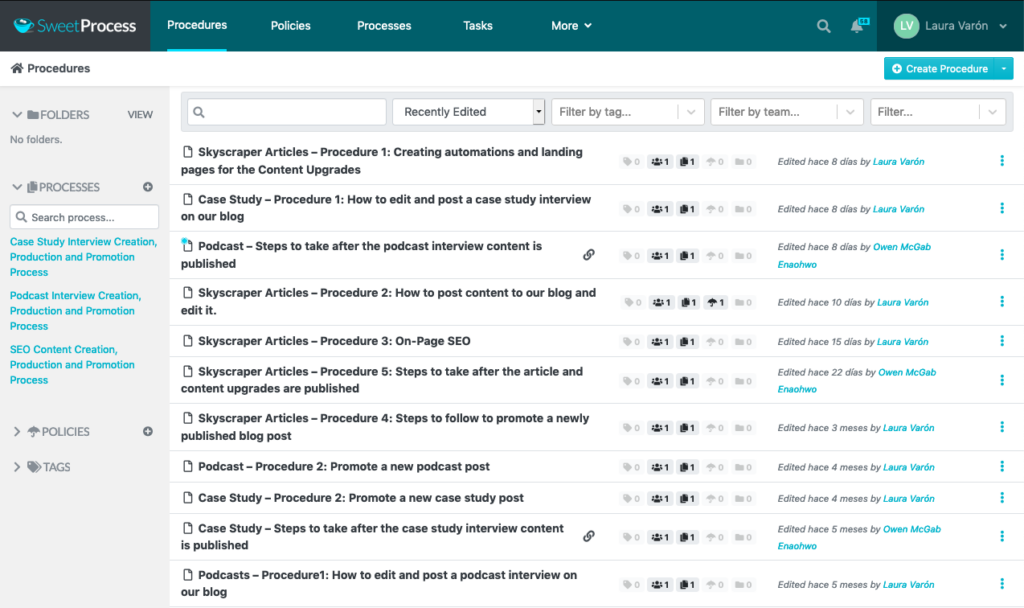
SweetProcess is an all-in-one knowledge management solution for small and mid-sized businesses seeking to systematize operations, cut employee ramp time, and remove the chaos resulting from undocumented procedures.
SweetProcess does more than store knowledge; it enables you to document step-by-step workflows, assign tasks to your team members, and collaborate in real time.
Whether you are a training manager, operations lead, HR director, or even the CEO, this platform enables you to construct your company’s how-to manual without becoming overburdened or consumed by complexity.
Key Features of SweetProcess
Here’s why SweetProcess is an absolute game-changer:
Procedure Builder
Use text, videos, images, checklists, and decision trees to explain complicated processes step by step. It’s all organized, searchable, and version-controlled. For example, your customer support agents use a common troubleshooting script—no guesswork or inconsistent service.
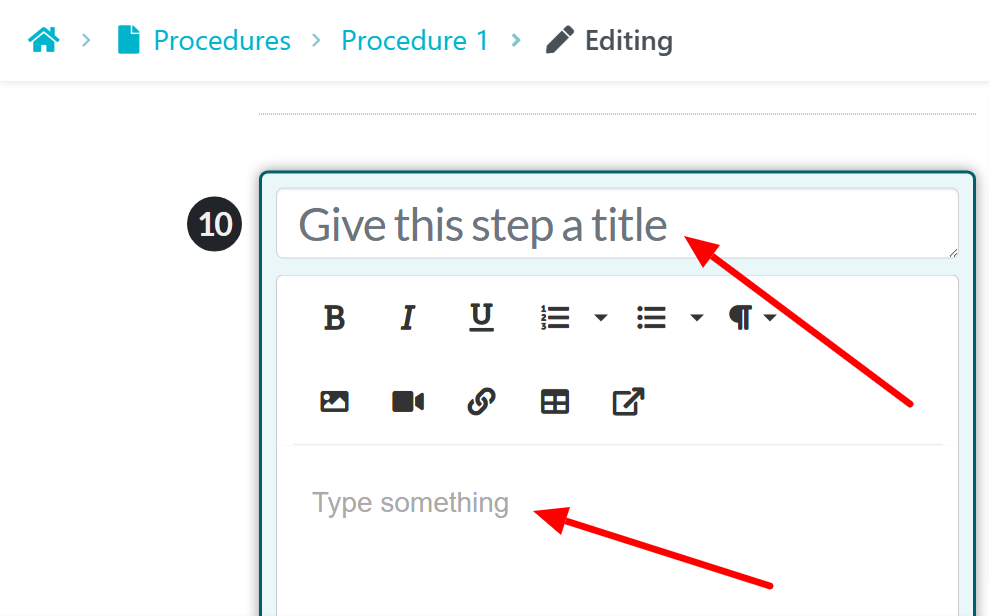
Process and Policy Management in One Place
Unlike fragmented tools, SweetProcess allows you to manage your procedures, policies, and knowledge base in one interface. It’s your internal Google, but for how your business really operates.
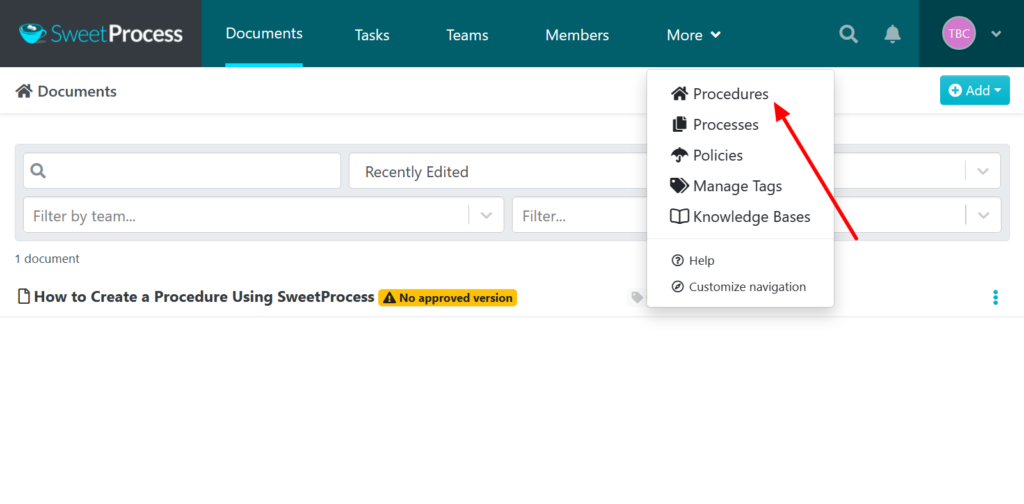
Smart Collaboration and Workflow
Employees can submit desired edits or updates to procedures, and managers will review and approve them. This means your documentation stays up-to-date and correct without sacrificing control.
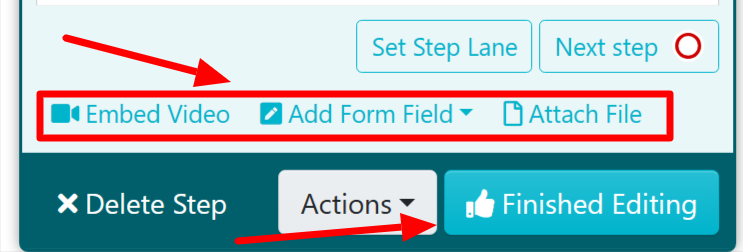

Directly Assign Tasks From Procedures
You can turn any step in a procedure into an actionable task and assign it to team members. Say farewell to conflicting email threads and sticky notes.
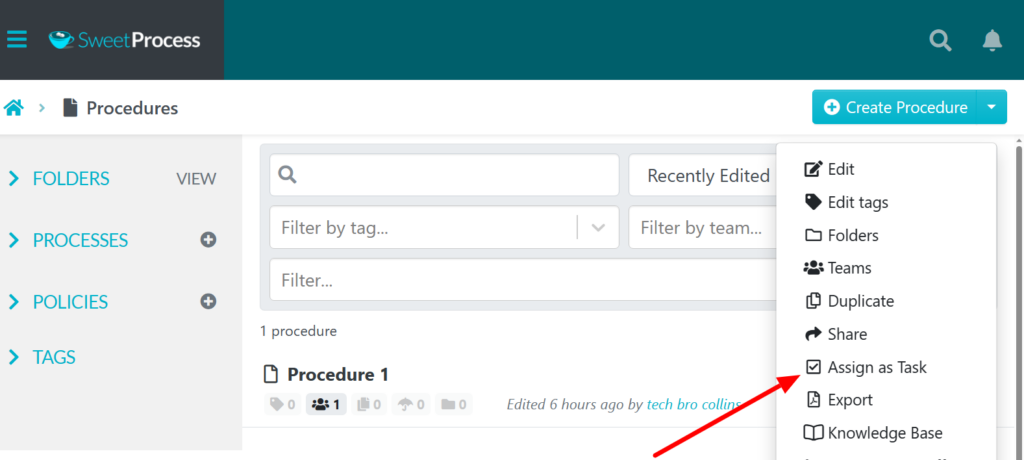
Smart Search and Tagging
With hundreds of procedures, your team can find exactly what they need within seconds. This is a massive productivity win, particularly in dynamic environments.


Cloud-Based and Available Anywhere
SweetProcess is ideal for both remote teams and hybrid workforces. Whether in Las Vegas or London, your systems are just a few clicks away.
Willing to spend less time on training, tighten processes, and scale without chaos? Go ahead, start your 14-day, no-credit-card-required SweetProcess trial.
2. HubSpot: Best Customer Support Self-Service
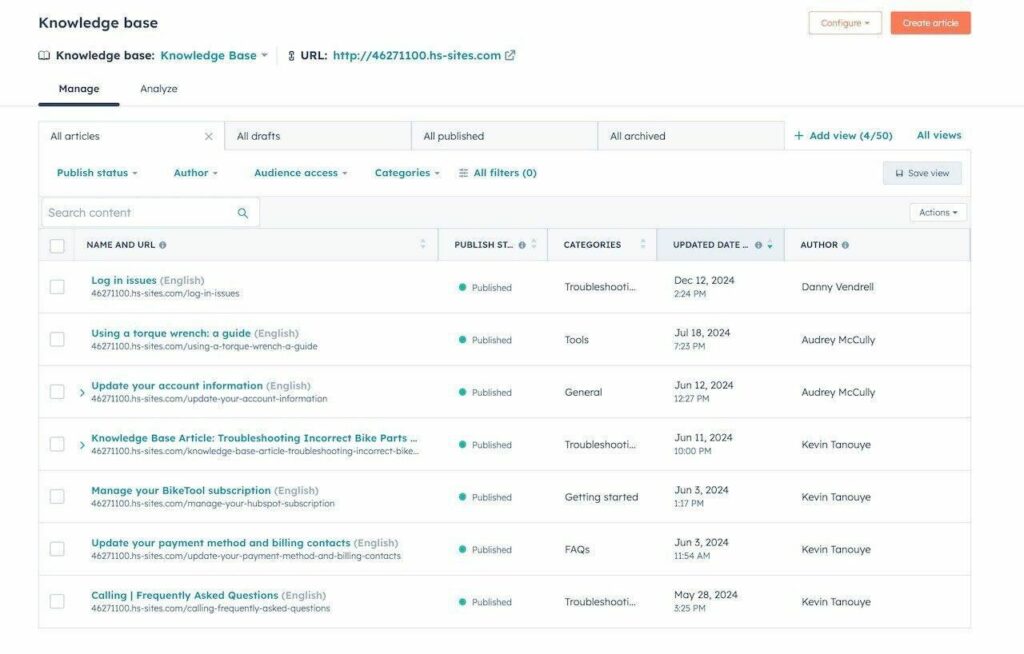
HubSpot is best known for its powerful CRM and marketing tools. However, its knowledge base software is an often-overlooked SaaS for self-service customers.
Ideal for teams aiming to minimize support tickets and enable users to discover answers quickly, HubSpot’s knowledge management system is intuitive and highly integrated within its overall ecosystem.
Key Features of HubSpot
- Data pre-processing for SEO-optimized knowledge base article
- Drag-and-drop article editor
- Enabled with search analytics to enhance content on an ongoing basis
- Unified with live chat, bots, and support tickets
- Custom branding and permission controls
HubSpot Pricing: HubSpot Knowledge Base is available in the Service Hub Professional suite, starting at $450/month. It is ideal for companies already using HubSpot as a CRM or seeking a comprehensive solution.
3. Guru—Best for Employee Learning in a Team Setting
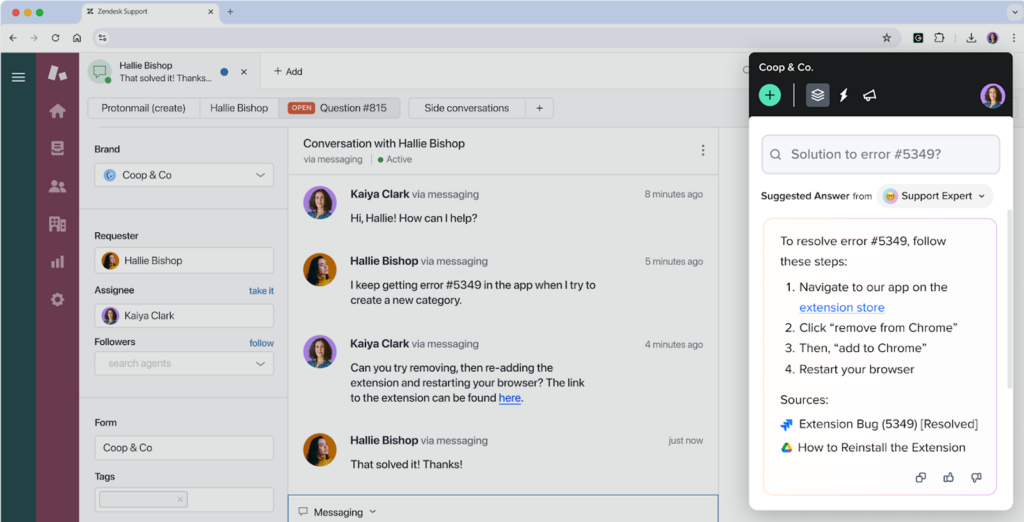
Guru is an AI-powered knowledge management tool that provides teams with relevant information in their workflow. Guru reduces context switching and encourages a culture of frictionless knowledge transfer.
Key Features of Guru
- AI Search: Guru’s AI-powered search is not limited to the keyword match. It knows the context behind the questions to produce highly relevant answers, sometimes even across apps.
- Guru combats knowledge decay directly with its verification feature.
- Browser Extension: Guru’s browser extension, a primary USP, embeds knowledge into web browsers and applications.
- Boards and Cards: Guru lays out information as Boards and Cards, with the goal of providing structure that is easy to understand and digest.
- Analytics: Guru tracks the usage of knowledge, allowing teams to see what information is being accessed, what information is missing, and how to bridge the knowledge gaps.
- Integrations: Guru integrates with a vast range of applications such as Slack, Microsoft Teams, Salesforce, and Zendesk.
Guru Pricing: Guru’s Starter plan is free, and their premium plans begin at $10/user/month.
4. Document360: Best Cloud-Based Knowledge Management
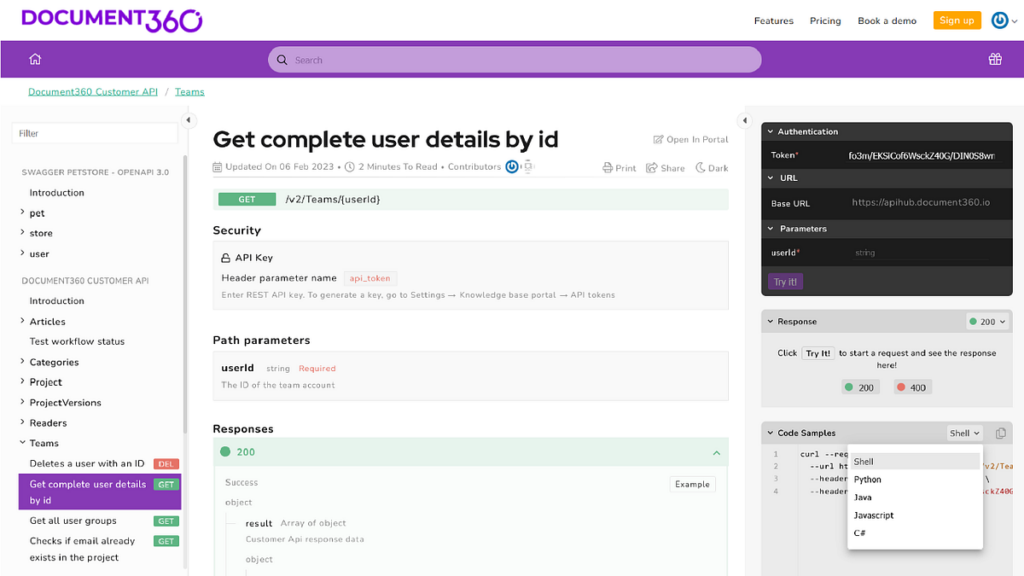
Document360 is cloud-based knowledge base software that allows you to build an airtight self-service knowledge base for your customers and in-house teams. It turns this into reality with its end-to-end tools for knowledge creation, organization, and management.
Key Features of Document360
- Multiple Knowledge Bases: A defining feature of Document360 is the ability to create multiple knowledge bases in one portal.
- Markdown/WYSIWYG Editor: Document360’s editor provides support for Markdown as well as a WYSIWYG editor, enabling content creators a high level of control over formatting.
- Categories and Subcategories Management: Document360 has a multi-level category structure that provides for logical and hierarchical organization, making it easier for users to navigate and obtain the right information they are searching for.
- Version Control: You can keep track of who made any changes and when thanks to Document360’s version control feature, which also enables you to revert to older versions if required.
- SEO Optimization: Document360 provides features to optimize knowledge base content for search engines, enhancing visibility and attracting organic traffic.
- Analytics and Reporting: Document360 comes with built-in analytics and reporting features that give insights into search queries, article views, and user feedback, allowing for data-driven improvements.
- Integrations: Document360 supports integrations with third-party tools, including help desk software and analytics platforms, for enhanced workflows and a seamless experience.
Document360 Pricing: A Standard plan is $149/month, with pricier tiers providing greater access control and integrations.
5. KnowledgeBase: Best Knowledge Management For Smaller Teams
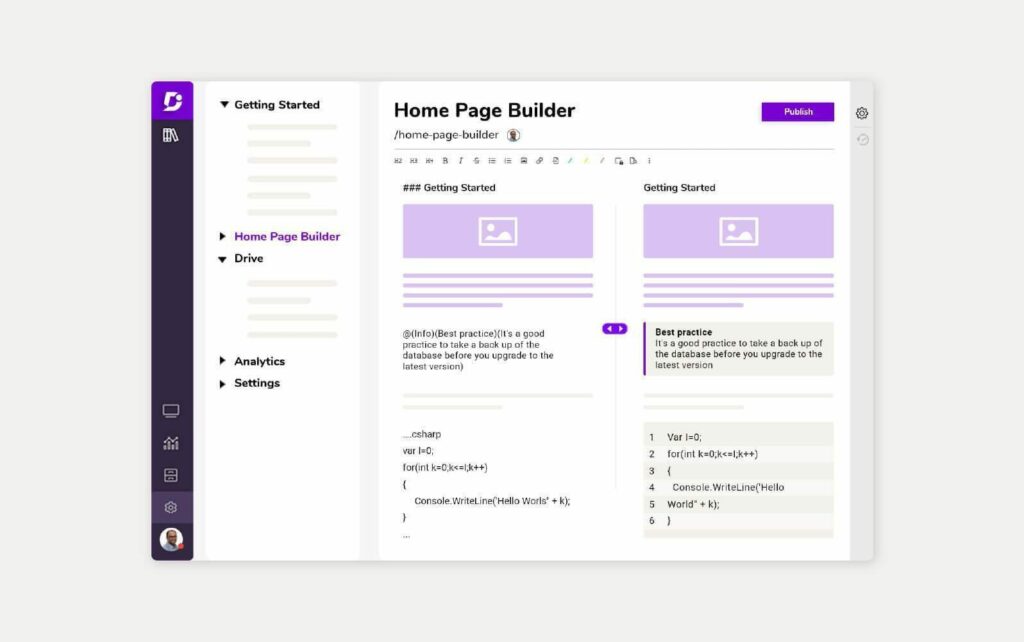
This is designed for smaller teams and growing businesses. KnowledgeBase is a very lightweight tool that helps you build internal wikis and FAQ sections in a matter of minutes.
It’s perfect for startups that need a bare-bones knowledge base with minimal startup overhead.
Key Features of KnowledgeBase
- Make articles with a WYSIWYG (what you see is what you get) editor
- Easy classification and labeling
- Widgets embedding for mobile apps and websites
- Drafts and internal comments
KnowledgeBase Pricing: KnowledgeBase is $59/month or $49/month with an annual plan. You can add more knowledge bases to your account for an extra fee (starting at $21.99 each).
6. Helpjuice: Best For Project Documentation
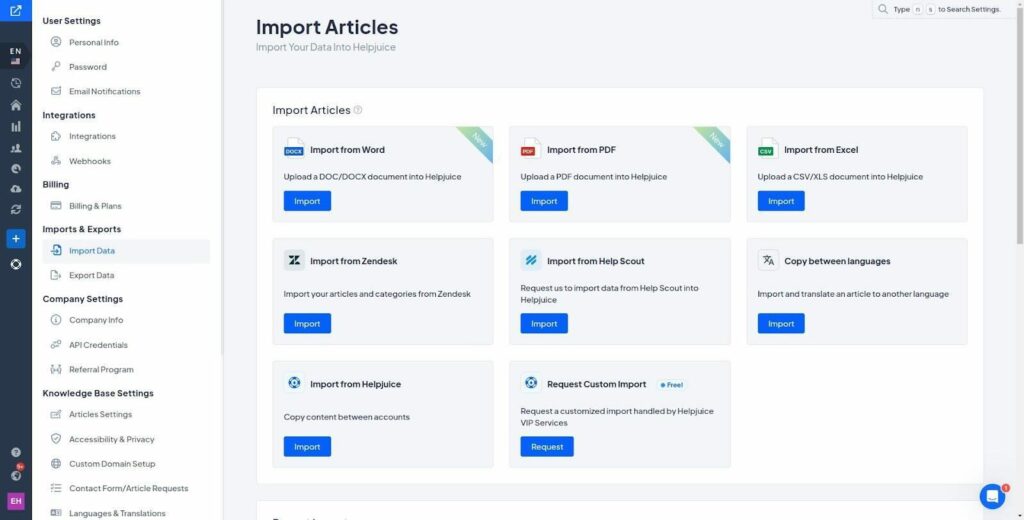
Helpjuice is a knowledge base software for managing internal and external documents. It enables teams to document projects and provides self-service support for customers.
Key Features of Helpjuice
- Smart Search: To help users quickly find information.
- Customization: Provides some options to customize the appearance of the knowledge base.
- Analytics: Helps to understand user behavior.
- Integrations: For when you need to work with other tools, software, CRM systems, and other applications, streamlining processes and improving efficiency.
Helpjuice Pricing: Helpjuice has four pricing plans: Starter Plan ($120/month for 4 users), Run-Up Plan ($200/month for 16 users), Premium Limited ($289/month for 60 users), Premium Unlimited ($499/month for unlimited users), and a 14-day free trial.
7. ClickUp: Best For Knowledge Sharing And Collaboration
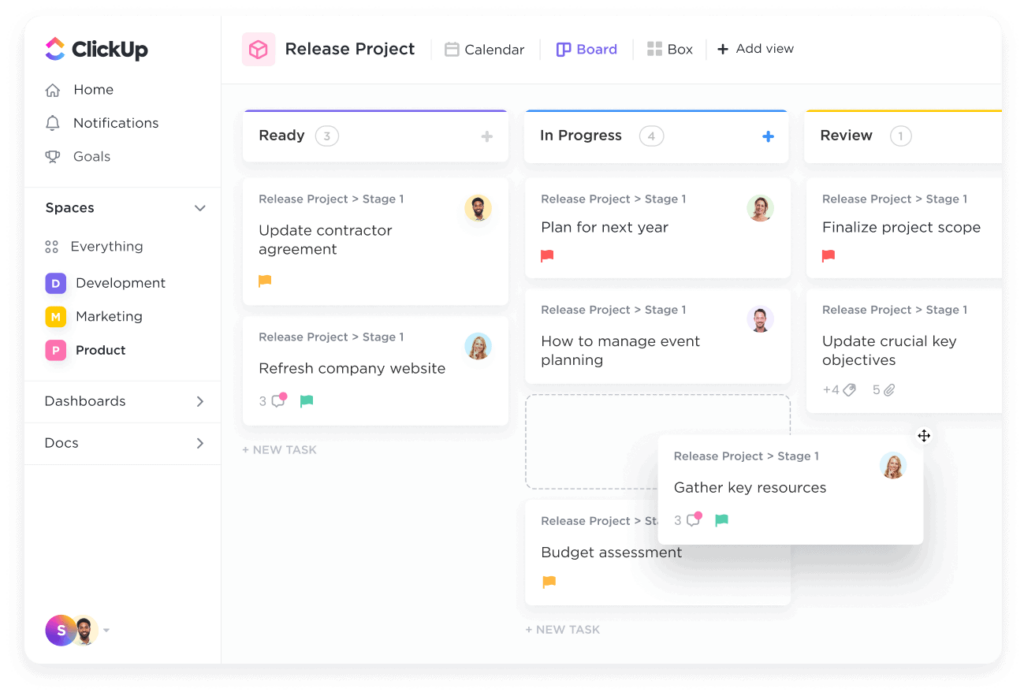
ClickUp is a productivity hub that offers task and project management, as well as knowledge-sharing capabilities. It seeks to be a central place for working and documenting.
Key Features of ClickUp
- Docs: Create and share documents.
- Task Management: Connect knowledge with tasks.
- Project Management: Allow for planning and tracking of projects.
- Enables Collaboration: Tools for team communication
ClickUp Pricing: ClickUp provides 4 flexible pricing plans: plan Free Forever ($0), plan Unlimited ($10/user/month), plan Business ($19/user/month), plan Enterprise (custom pricing). It also has a special 30% discount on annual billing.
8. Hiver: Customer Service and Internal Collaboration
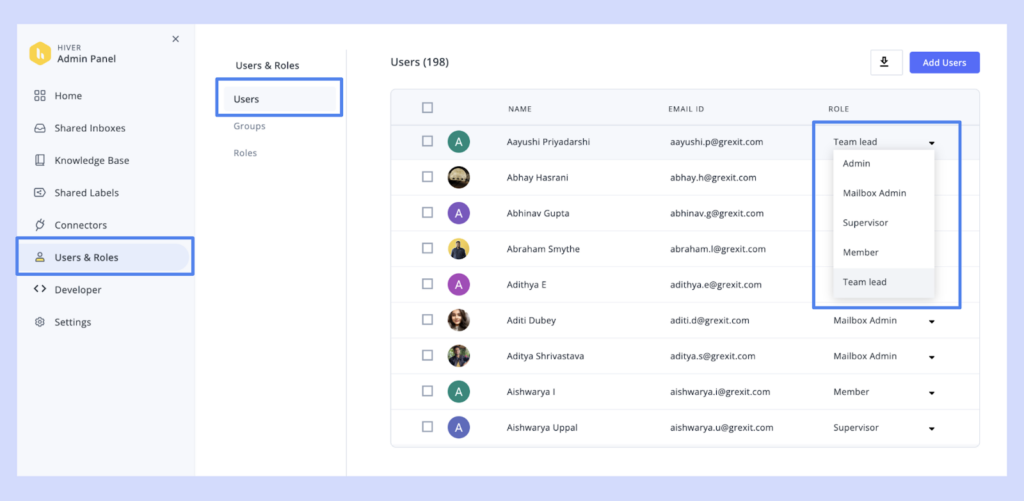
Hiver is a help desk solution with knowledge management capabilities that integrates with Gmail. It improves customer service and team collaboration.
Key Features of Hiver
- Shared Inbox: Manage customer emails together.
- Assignments: Allows for conversations to be assigned to members of the team.
- Notes: Helps internal conversations be in better shape.
- Knowledge Base: Helps create help articles and FAQs.
Hiver Pricing: Hiver has a free forever plan with multi-channel shared inboxes, ticketing, live chat, and a knowledge base. Paid plans start at $19/user/month (Lite) and go up to $29/user/month (Growth) and $49/user/month (Pro) with custom pricing for the Elite tier.
9. Stonly: Best For Solution-Focused Customer Support
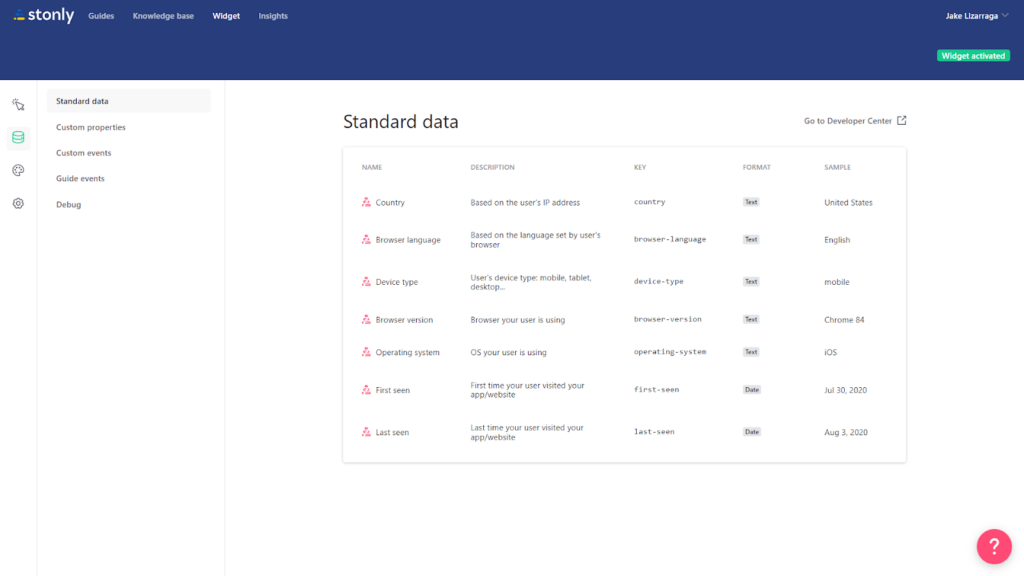
Stonly uses an interactive guide and knowledge base to help customers find solutions to their issues without the help of customer service.
Key Features of Stonly
- Interactive Guides: Step-by-step process.
- Knowledge Base: Stores support articles.
- AI-Powered Search: More accurate search results.
- Analytics: User interaction tracking.
Stonly Pricing: Stonly’s four pricing tiers: Starter ($124/month for 30 interactive guides and essential features), Business ($249/month for advanced targeting and multi-language support), Enterprise (custom pricing, SSO, and priority support), and Free Trial (basic interactive guides).
10. ProProfs Knowledge Base: Best For Managing Internal and External Knowledge Base
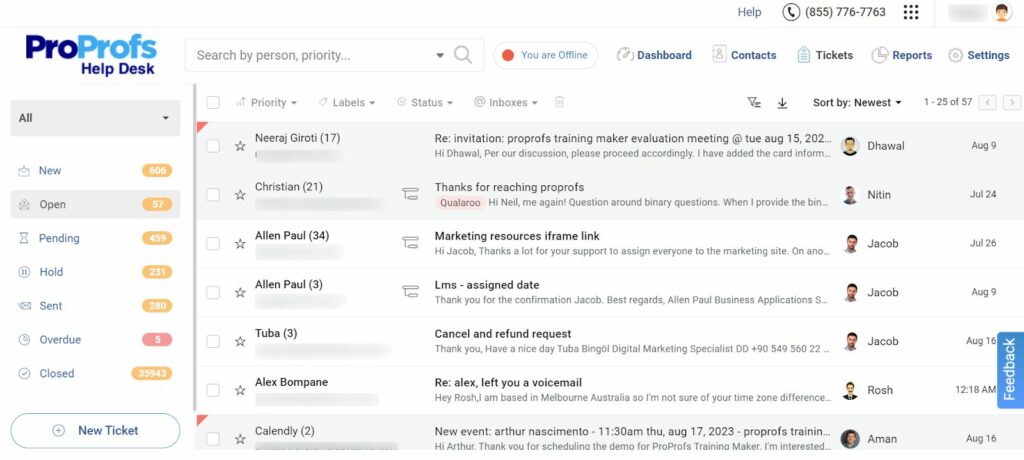
ProProfs Knowledge Base enables businesses to create online knowledge bases for both customers and employees.
Features of ProProfs Knowledge Base
- Templates: Provide ready-made templates.
- Customization: Lets you brand/re-design.
- Data Knowledge: Ability to search for information.
- Reporting: Helps you understand usage of the knowledge base.
ProProfs Pricing Plans: ProProfs Knowledge Base provides a free plan, which offers up to 25 pages. Author/month (billed annually), paid plans start from $49/author/month.
11. Knowmax: Most Useful For AI-Guided Knowledge Management
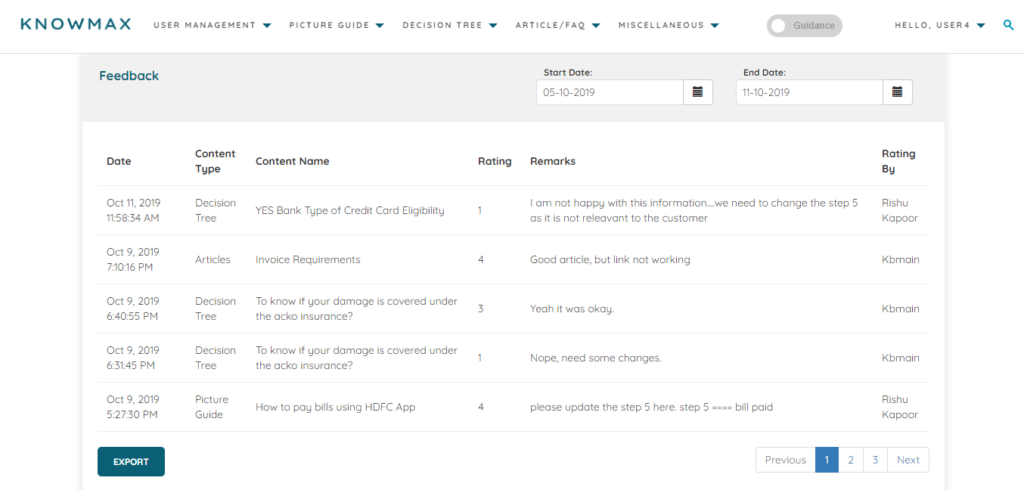
Knowmax is an AI-driven knowledge management platform that helps improve support processes for customers and agents.
Key Features of Knowmax
- AI-Powered Search: Improves overall search experience.
- Guided Workflows: Step-by-step guidance.
- Omni-Channel Integration: Connects various communication channels.
- Analytics: Provides knowledge base performance insight.
Knowmax Pricing: Knowmax provides a cost-effective pricing plan allowing users to pay $14.99 per user per month for the basic and $18.00 per user per month for the premium plan, in addition to its free version and free trial to know the product well.
Selecting an Appropriate Knowledge Management Tool
Let’s be honest—there’s no single best solution for knowledge management. The ideal software is unique to each company, reliant upon team size, workflows, initiatives, and scalability. But one thing is true the world over: documenting your processes isn’t optional—it’s a strategy for growth.
If you’re a small or mid-sized business owner who’s tired of reinventing the wheel, wasting time on the same questions over and over, or training every new hire from ground zero, month after month…
Your best option is SweetProcess.
SweetProcess is tailored for clarity, simplicity, and real-world results—without the clutter, cost, and complexity of large enterprise tools. And the stories from actual customers prove it works.
How To Create and Share Your Company’s Knowledge Using SweetProcess

According to Interact, employees spend 19.8% of their week looking for internal information or trying to track down colleagues who can help with their work. That’s a complete day lost each week. For fast-growing teams, that’s not only inefficient—it’s unsustainable.
Now, imagine the opposite.
Even if key people leave, imagine your business running like clockwork. Onboarding a new hire in hours, not weeks. Picture never asking, “Where’s that document?” again. That’s not a fairy tale—it’s how companies like TechQuarters and Location Accès Crédit saw things unfold when they switched to SweetProcess.
SweetProcess is not only a knowledge management tool; it’s also a central nervous system for managing operations at scale. Let’s walk through exactly how you can document, organize, and share every last bit of knowledge in your company with clarity, control, and confidence.
Document Your Company’s Knowledge As Procedures and Processes
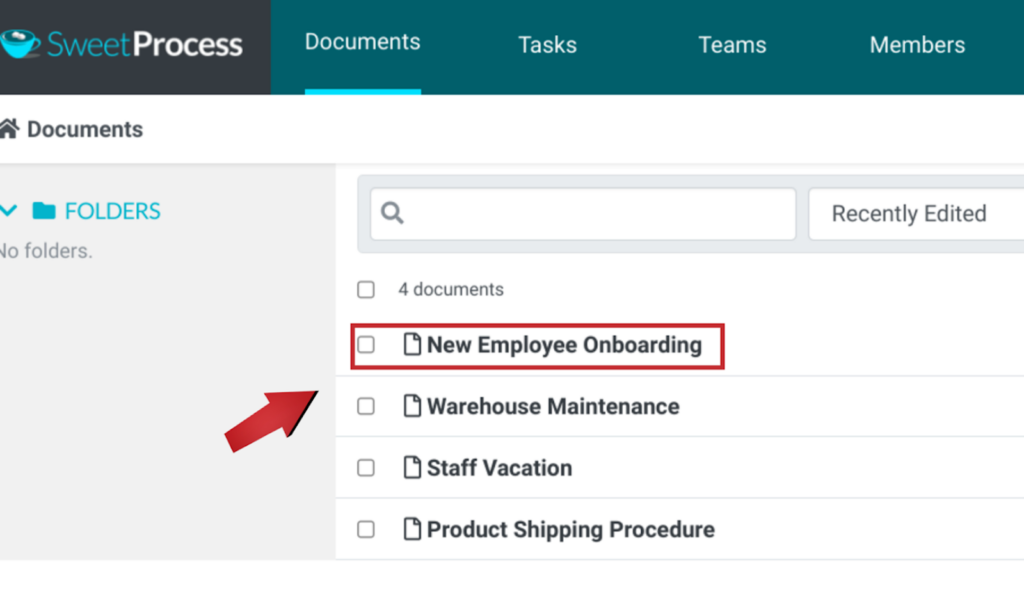
Onboarding new hires, standardizing customer service, and automating IT workflows all begin with documented processes.
With SweetProcess, you can turn mundane know-how into step-by-step, repeatable processes. No more scattered Google Docs, no more mystery checklists, just clean, centralized, and collaborative documentation.
Your team can provide their expertise in real time, and every process can contain rich media like video, screenshots, and decision trees. And with built-in version control, you’ll never lose track of changes or edits.
Turn Existing Procedures and Processes Into a Beautiful Knowledge Base
You can create new procedures in SweetProcess when a new situation arises. It is not just documentation, but live knowledge that grows as your business grows.
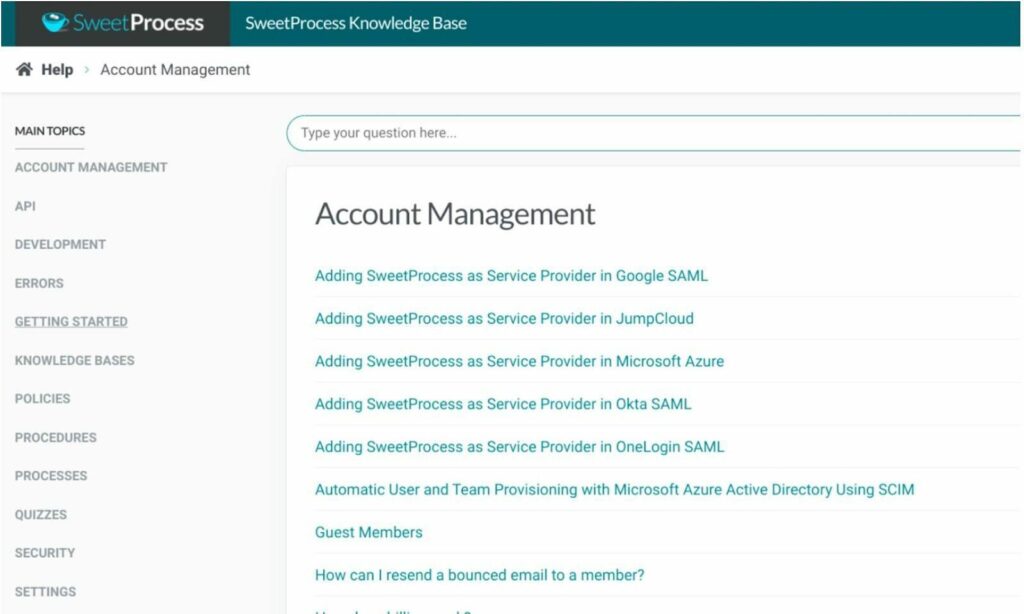
You’re not documenting for documentation’s sake. You’re building an environment where your team can:
- Get answers to repetitive questions in seconds.
- Avoid waiting for a manager to spoon-feed them.
- Have fewer guesses and more execution.
All of your procedures, policies, and how-tos can be organized into folders, tagged by department, and restricted by role. The result is clarity without chaos, with no more bottlenecks. So, rather than having to ping managers or ask around in Slack, employees find how-to answers when they need them, which translates into fewer interruptions, faster work, and greater job satisfaction.
Build Your Company’s Internal and External Knowledge Base

Whether you manage internal teams or support external clients, information is currency. SweetProcess allows you to set up two knowledge bases—one for your team’s internal knowledge and one for your potential and existing customers.
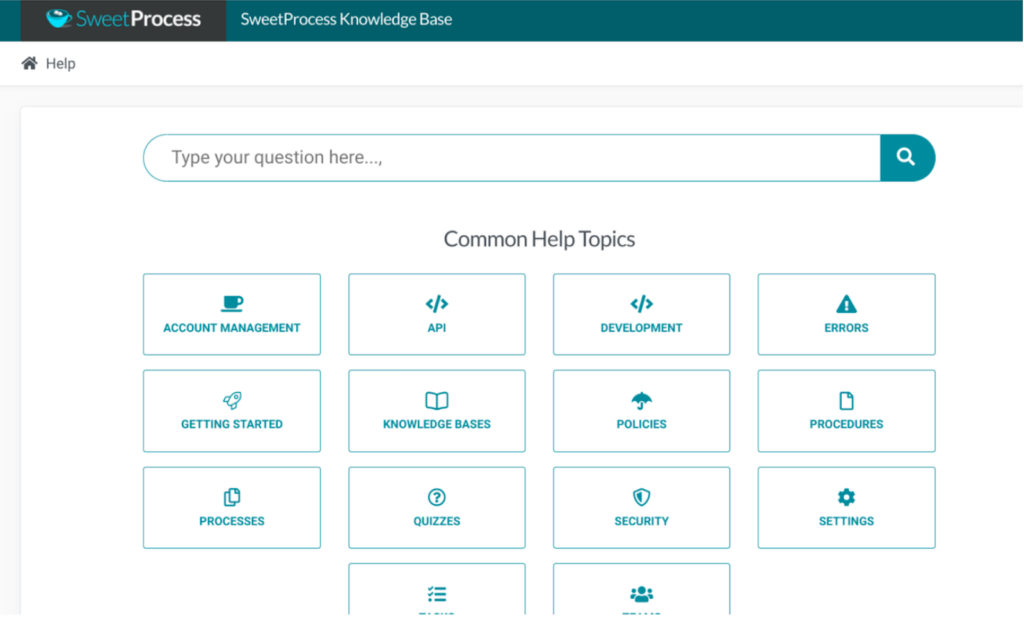
Suppose you are a software company and getting numerous requests for support. Rather than answering the same questions repeatedly, you use SweetProcess to create:
- Troubleshooting playbooks to guide your team internally.
- External knowledge bases for customers with FAQs, product tutorials, and how-tos.
Manage Your Company’s Knowledge in One Single Place

If you’ve been using different tools for your documentation, project management, and training, it’s time to bring them all together.
SweetProcess provides you with all that in one centralized platform:
- Process documentation
- Team collaboration
- Knowledge bases
- Policy management
- Iteration through the version history and feedback
No more switching tabs. No more duplicating effort. Just seamless flow of knowledge from creation to execution.
And because it’s built for actual adoption (not just IT teams), everyone from HR to sales to ops can use it, without training wheels.
SweetProcess Is More Than Just Software. It’s a Strategic Advantage.
Let’s summarize the events when you create and share your company’s knowledge using SweetProcess:
- You document once—and then it’s for life.
- Your team works faster—with fewer errors.
- You onboard in days—not weeks.
- You lessen dependence on crucial staff—and strengthen business resilience.
How SweetProcess Helped TechQuarters Transform Chaos Into Scalable Knowledge
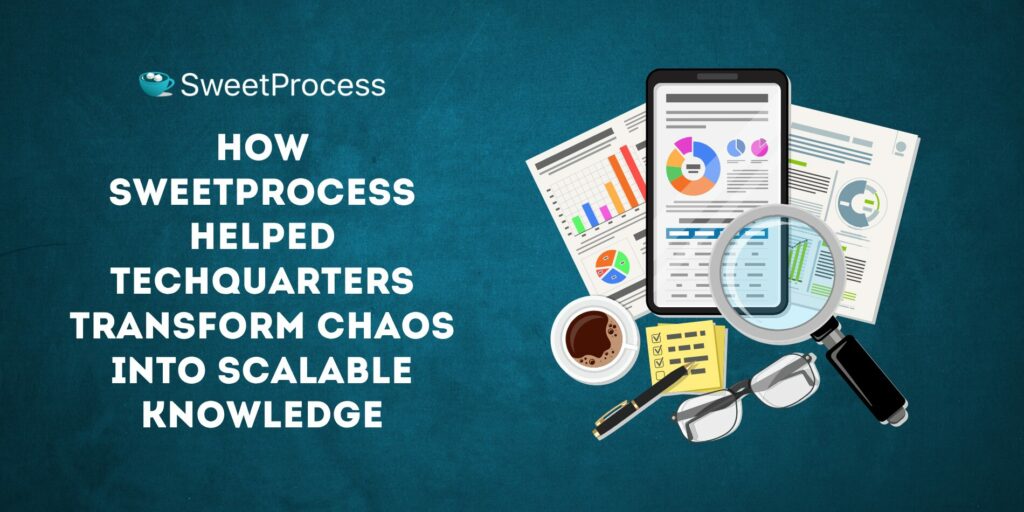
TechQuarters is London’s fastest-growing IT services provider, delivering managed technology solutions for small and mid-sized businesses. However, as their client list and in-house teams grew, one significant challenge emerged: tribal knowledge.
The Challenge
Initially, everything seemed to be functioning fine. They had a capable team, increasing demand, and happy customers. But underneath, operations were precarious.
Each department had its own methods for addressing these issues. Shadowing veterans was the dominant onboarding method. Processes were saved all over the place in files, folders, and employees’ minds. And every time someone left, along with them went their knowledge.
“With each new technician brought on, we had to retrain them on every single procedure through a manual process.” Mark O’Dell, Operations Director at TechQuarters, said. “It was slow and inconsistent and frankly exhausting.”
They needed a way to record institutional knowledge, eliminate redundancy, and bring consistency across the board without overwhelming management.
The Solution
What began as an interest in a checklist tool rapidly turned into a complete revolution in the way they approached knowledge management. It was here that SweetProcess enabled the team to document, manage, and share each process in a single cloud-based solution.
- IT support processes were turned into guidelines.
- Embedded videos/screenshots documented the training modules.
- Updates were tracked by versioning and approval.
- Departments improved standard operating procedures (SOPs) together, and still retained control.
Implementation was seamless. Within weeks, thousands of departments were creating and using procedures on a daily basis. SweetProcess became the go-to resource for answers.
“Now, any time something goes wrong or a new scenario arises, we solve it in SweetProcess—and it’s solved for everyone,” CEO Chris Dunning said.
The Results
Since starting with SweetProcess, this is what TechQuarters has achieved—and the results extend far beyond operational efficiency:
It originally took three weeks to train a model, a time that was reduced to just three days after implementing SweetProcess.
- No more tribal knowledge, single source of truth.
- New hires got productive faster, which reduced service delivery delays.
- Consistent, documented service protocols improved the experience for the customer.
The return on investment was evident almost immediately. SweetProcess went beyond capturing knowledge to scaling results.
How Location Accès Crédit Created a Holy Bible of Knowledge Using SweetProcess

Location Accès Crédit is a Canadian financial services company that specializes in offering automotive loans and vehicle financing options through its extensive network of more than 2,000 dealerships throughout Quebec.
The Challenge
When the company grew, the fissures in their operation model widened. Different branches had their particular mannerisms. New employees relied on word of mouth or the instructions of direct managers to understand processes. There was no standardization; events led to confusion and errors.
Prior to SweetProcess, their processes were distributed on paper files, personal knowledge/notes, and by word of mouth. According to Michel Coutu, President, Location Accès Crédit, “We were not able to scale efficiently. “Every team had their own way they wanted to do things.”
Remote work also revealed the shortcomings of their disparate knowledge system. Staff in non-headquartered locations had the most critical policies and workflows out of reach. Team members were unable to confidently bring new hires up to speed or execute tasks on their own.
As more and more information was collected and a lack of centralized, accurate knowledge system became more than just an annoyance—it was now a hindrance to growth.
The Solution
Location Accès Crédit was looking for a better solution, so they decided to use SweetProcess. SweetProcess promised more than documentation—control and distribution of knowledge in real time across the organization.
Here’s how they used it:
Centralization: All company policies, HR procedures, compliance workflows, and operational tasks were placed on SweetProcess.
Collaborative Documentation: Employees proposed edits or added information, and managers ultimately approved changes to ensure the information was accurate.
Cloud-Based Access: Team members, no matter where they were, now had access to the same on-demand procedures.
Visibility Control: Users were limited in what they were able to see in the system, to only what was pertinent to their jobs while also keeping both clarity and confidentiality.
As Michel described, SweetProcess was like their Holy Bible for operations.
“If someone says ‘how do you do this?’, I don’t even tell them—I say, ‘go to SweetProcess’,” he said.
It gave teams the power to work without touching base at headquarters or at each other’s homes. It also freed Michel and his leadership team to go from reactive management to proactive scaling.
The Results
After implementing SweetProcess, Location Accès Crédit has:
- Less onboarding and training time across departments.
- No more paper documentation and scattered policies.
- Ensured that all venues operated smoothly.
- Created a cycle of knowledge-sharing between leadership and staff.
- Controlled knowledge updates with an inbuilt approval workflow.
The success of SweetProcess at Location Accès Crédit was not only about time saving or process improvement, but about creating an infrastructure enabling intelligent scaling.
Now, every department plays by the same playbook. Employees don’t guess. They don’t wait. They take action—confidently, quickly, clearly.
Do you want to have the same transformation?
If you are tired of relying on tribal knowledge, training manuals, and inconsistent execution, then this is your opportunity to gain control.
Types of Knowledge Management Tools

Most organizations are aware that knowledge has value, but few know how to systematically capture, structure, and scale it.
If you’re aiming to align the right type of knowledge management software with your own set of goals, for onboarding, internal communication or external support, it’s important to first understand the types of knowledge management software available.
Here’s a breakdown of the top categories:
1. Open Source Knowledge Base
Open-source tools such as open-source, BookStack, and Documize, give organizations complete flexibility. It allows you to host the software on your own servers, modify the code, and manage the whole infrastructure.
Pros:
- You have control over the UI and features
- Economic advantage (licensing free of charge)
- Best suited for developer-heavy teams
Cons:
- Requires internal development resources
- Slower implementation
- Community support may be outdated
It is best for: IT departments, development teams, or technical startups needing custom-tailored solutions with time allocated for building.
2. Proprietary Knowledge Base
These are off-the-shelf platforms, such as Guru, Helpjuice, or ProProfs, that are built for quick deployment and simplicity. With those, you typically get strong support, integrations, and security.
Pros:
- Easy setup and low learning curve
- Frequent updates and support
- Cloud-based and scalable
Cons:
- Limited customization
- It may come with per-user fees
Best for: Mid-sized businesses and support teams that want plug-and-play systems that don’t require internal IT administration.
SweetProcess is one of those—but with a huge twist. It balances proprietary workflow structure with flexibility in internal operations, onboarding, policy management, knowledge sharing, and more.
3. Content Management Systems (CMS)
Platforms like WordPress, Apache, Drupal, and Joomla were initially built for content publishing but have been reformed or repurposed for internal documentation and wikis.
Pros:
- Familiar interface for content creation teams
- Publishing and search engine optimization tools
- Easy contribution for non-tech users
Cons:
- Not designed specifically for SOPs or workflows
- Poor internal collaboration and approvals
Best for: Marketing teams or content-powered organizations that want to host internal guides or publish public documentation.
4. AI-Driven Knowledge Management
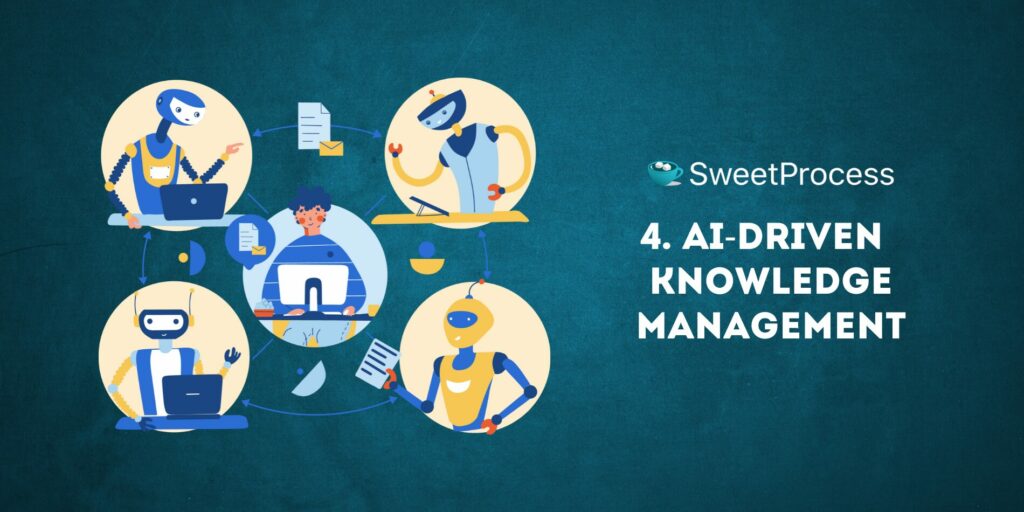
Cutting-edge platforms such as Bloomfire and Stonly employ AI to recommend on-point material, automatically add tags, and adapt content to each user.
Pros:
- Smarter search and discovery
- Scalable across large teams
- Sensitive adjustments based on usage
Cons:
- Higher cost
- Machine learning accuracy of AI based on training data
- Risk of overreliance on automated systems
Best for enterprises that maintain large knowledge repositories or customer-facing support teams requiring fast contextual answers.
5. LMS (Learning Management Systems)
LMS systems like TalentLMS, Docebo, and Absorb LMS are focused on structured training, certification, and compliance tracking.
Pros:
- Extensive training features (quizzes, scoring, gamification)
- Great for formal onboarding and eLearning
- Monitors and includes performance metrics
Cons:
- Not great for knowing things when you need them
- Less agile for the capturing process
- Too much for small teams
Best for: Human resources (HR) teams or learning and development (L&D) professionals implementing employee development programs and required training modules.
6. KCS (Knowledge-Centered Service)
KCS is a methodology and a technology stack. Tools like Zendesk, Salesforce Knowledge, and ServiceNow embed knowledge capture within the customer support workflow.
Pros:
- Knowledge is built and modified in real time with support
- Combines with help desk systems
- Great to decrease ticket volume
Cons:
- It can be complex to implement
- Primarily support-focused
- Visibility of internal processes is often missing
Best for: Support-heavy organizations with high ticket volume seeking to embed knowledge management directly in customer interactions.
Although each of these tools has its utility, few offer internal SOPs, onboarding workflows, team collaboration, and customer support documentation in one seamless experience.
And that’s where SweetProcess outperforms others.
From startups to growing enterprises, SweetProcess makes knowledge management easy across the board (no extra tools or multiple IT admins required).
Benefits of Knowledge Management Software

If you’ve ever watched two employees ask the same question 10 minutes apart, you feel the pain of the missing documentation. But the true cost is more complex.
Slow onboarding, sloppy service delivery due to a lack of sufficient knowledge, and nonexistent knowledge repositories create bottlenecks at every level of the business. This is how an amazing knowledge management system like SweetProcess can change the way your business operates.
Personalized Customer Service Interactions
Ninety percent of customers expect consistent interactions across channels, according to Microsoft—and that starts with internal consistency.
A centralized knowledge base empowers support reps and sales teams with instant access to answers, processes, and product specs, tailoring each interaction instead of playing catch-up.
The result you get is happier customers, higher retention, and fewer escalations.
Faster Support Solutions
According to Zendesk, the majority of service costs come from agent time spent hunting down answers.
When reps have step-by-step troubleshooting guides and decision trees in front of them, they can solve problems more quickly, without needing to escalate tickets or ping senior staff.
SweetProcess users regularly find that their support resolution time is up to 50% shorter when they use SOPs that are real time and searchable.
Reduced Service Volume

A knowledge base is not only for your team; it’s an effective self-service tool for your customers.
When 80% of questions are answered proactively by your help center, fewer people reach out for help, enabling your team to focus on higher value work.
Using SweetProcess, companies that publish public-facing guides and walkthroughs report fewer support tickets and higher customer satisfaction.
Better Decision-Making
Picture two managers working to resolve the same issue, but one has access to previous SOPs, policy documents, and process updates at their fingertips. Who makes the better call?
Knowledge management transforms experience into systems, and these systems drive smarter, faster, data-backed decisions.
Teams know they have the latest information to act on, every time, thanks to SweetProcess’s approval workflows and version control.
Enhanced Collaboration
It’s magical when all your marketing teams, HR staff, and customer success reps can see and contribute to the same knowledge base.
With SweetProcess, you don’t have to face duplicated documents or Slack threads disappearing into the void. You enjoy smoother collaboration, more transparency, and better execution of tasks.
Whether you’re scaling a remote team, onboarding new hires, or working to deliver more consistent solutions for customers, knowledge is your leverage.
And what’s the best way to unlock that leverage? SweetProcess.
SweetProcess is the tool that converts experience into systems, systems into clarity, and clarity into scalable growth.
Streamline Your Knowledge Management Using SweetProcess
Depending on which side you are on, knowledge is either your greatest asset or your biggest liability. When it’s locked away in employees’ heads, scattered across tools, or buried in outdated documents, it creates confusion, slows down operations, and stunts growth. But when captured, organized, and shared effectively, it becomes a force multiplier for your team’s performance.
That’s where SweetProcess shines.
Whether you’re onboarding new hires, scaling operations, or delivering consistent customer experiences, SweetProcess helps you document every procedure, centralize every policy, and build a searchable knowledge base your entire organization can trust.
Unlike tools that only scratch the surface, SweetProcess is built to handle everything from internal SOPs to public-facing help docs—complete with team collaboration, approval workflows, and seamless version control. It’s clean. It’s intuitive. And most importantly, it’s used by real companies like TechQuarters and Location Accès Crédit to reduce training time, eliminate bottlenecks, and scale with confidence.
The bottom line? If you want to simplify your knowledge management, don’t duct-tape it—systematize it.
With SweetProcess, you’re not just saving time. You’re building a business that runs like a well-oiled machine, regardless of turnover, team size, or industry.
Start your 14-day free trial of SweetProcess today and experience what clarity at scale really looks like.
No credit card. No friction. Just powerful knowledge, finally in the right place.

